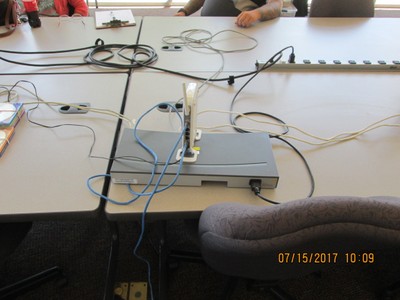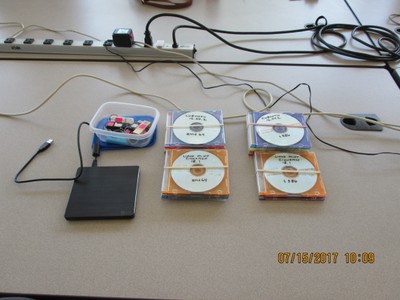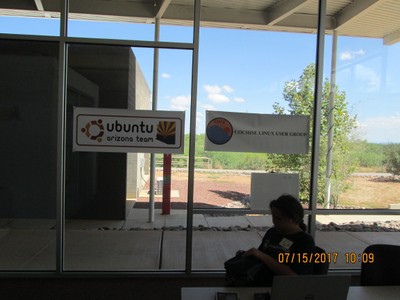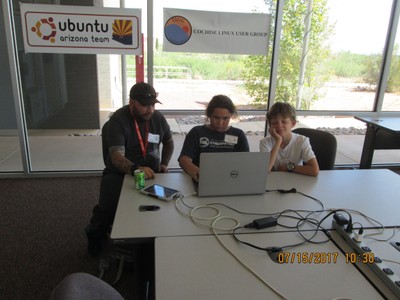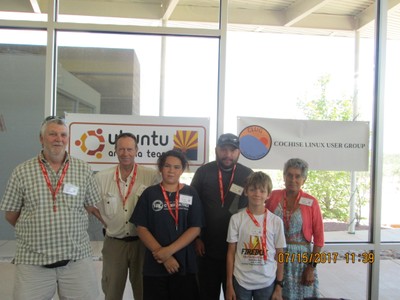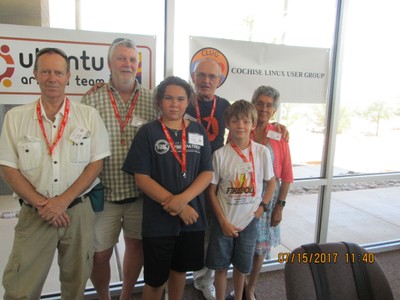Sierra Vista Installfest
The Cochise Linux User Group in conjunction with the Ubuntu Arizona Local Community Team conducted an Installation Festival on Saturday, 15 July 2017 at the University of Arizona South, Sierra Vista campus our gracious sponsor. Twelve people attended the event.
PREPARATIONS:
-
Coordination for a location was be done early with Dr. John DeLalla, Director of Continuing Education at the U of A. A key to the Learning Resource Center building was obtained from Dr. DeLalla before the event because the building would not normally be open on Saturdays. Arrangements to have the toilets open during the operation of the Installfest was made with Security.
-
Publicizing the event started approximately one month before the event and took the form of flyers that were posted in various locations around town, posting a notice in the Cochise Trading Post, posting a notice on the Sierra Vista Herald’s on line web site which is also published in the newspaper generally the day before and the day of the event (http://www.svherald.com/calendar/#/), and sending copies of the flyer to the Group mailing list for distribution at their places of employment and worship. Dr John DeLalla further publicized the event with a University flyer since the event would be sponsored and hosted by them. Although information about securing radio space on the Community Calendar was researched and provided by Cody Roehsler, there was not follow up.
-
No additional hardware was needed since all of the donated hardware was still on hand from the previous Installfest conducted in January 2017 and remains on hand for future events. It is in the physical possession of Rex Bouwense. Two 16 socket power strips were again loaned to the Group for the event by David Goes. A UA South router was borrowed from the school IT instructors.
-
Software in the form of installation media, DVDs and USB thumb drives, that was created by Rex Bouwense was still on hand and remains so for future events.
-
Ubuntu SWAG, already on hand, was available to be passed out at the event. Items included Ubuntu lanyards, install disks, stickers, and pins.
-
Flyers with information about AZLOCO and CLUG mission, activities, and event dates as well as Free an Open Source Equivalents to proprietary software applications were also available for distribution to the clients.
-
Training of members on installation procedures took place at regularly scheduled CLUG meetings for those people who thought that they were a little weak or apprehensive about installing a Linux Operating System on a stranger’s computer.
-
We limited our installation ISOs to Ubuntu, Ubuntu “flavors”, and Linux Mint. If dual boot is requested, we will not dual boot with an obsolete operating system (in other words only Win7, Win8.x, and Win10). We would be encouraging dangerous behavior that might put a client’s computer and data in a compromising situation.
-
Name tags were created for attending members.
-
A post installation check-list was created and on hand at the event. Training was conducted on the checklist at a regularly scheduled CLUG meeting.
-
A user name and password for the UA South WiFi was obtained by Rex Bouwense prior to the event. We discovered that it could be used on multiple computers, so this should be done for future installfests.
-
A thumb drive with video and still pictures was on hand to determine if the installed programs were functioning correctly.
LESSONS LEARNED:
-
Because of the poor attendance we need to look hard at our marketing strategy and change it. Perhaps the decision to have an Installfest in the Summer months was made without realizing the ramifications. The use of Facebook, as well as other avenues, as part of the marketing strategy needs to be explored.
-
Continue to stress in advertising the event, that customers must back up any data that they want to keep because it may be lost during a dual boot install and will be lost during a whole disk install.
-
Continue to conduct training for our members on installation and post installation procedures, dual boot, and whole disk install. They are not complicated but will serve to ensure that the client understands how to use the operating system that was installed on his/her computer.
